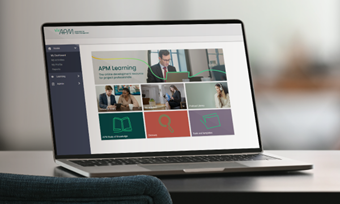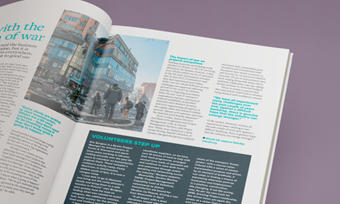
The APM Learning portal is an online resource which provides members with access to digital guides, modules and other digital learning resources as part of the membership benefit.
Information management is the collection, storage, curation, dissemination, archiving and destruction of documents, images, drawings and others sources of information.
Definition from APM Body of Knowledge 7th edition

Project-based working relies on accurate and timely information and data for teams and stakeholders to make informed decisions and fulfil their role in a cost-efficient and effective way.
Effective information management enables project teams to use their time, resources and expertise effectively to make decisions and to fulfil their roles.
The process of information management encompasses:
Collection of project information can take many forms, such as written, video, oral, audio or electronic. It is important to collect only as much information as reasonably needed and assure its quality, i.e. that it can be trusted (SOIPM3).
Storage is important for a range of purposes including: analysis, identifying historical trends, developing lessons learned, satisfying legislative requirements etc. Appropriate controls – including user access, export controls, versioning, change control, audit, and back-ups – must be established. (SOIPM3)
Curation includes the process of gathering and organising information relevant so that it can add value.
Dissemination involves consideration of questions such as: what information is to be distributed, to whom, in what format, how often, under what circumstances and using what security protocols? (SOIPM3)
Archiving takes place after a period of time, usually determined by a mix of company policy and judgement. Because of the large volumes of information archived, an effective classification system that anticipates future uses is essential (SOIPM3).
Destruction eventually takes place because the information is no longer deemed important, especially in comparison to the on-going storage costs and legislation e.g. privacy laws, only allows the storage of information for a prescribed period (SOIPM3).
Project, programme or portfolio documentation provides wide benefits and behaves as a tool to show plans and control the process.
Defining information management processes and responsibilities is a key set-up activity because project professionals need reliable information to communicate with the team and wider stakeholders and to provide documentary evidence for assurance.
As documents and other information are created and subsequently updated, version control is established to ensure that time and money are not wasted with people working with superseded versions.
Project professionals also:
Iterative or agile projects place greater emphasis on the discovery and recording of emergent information rather than reliance on pre-approved plans and are likely to employ dynamic modes of capturing such new information.
What are the differences between Knowledge Management (KM) and Information Management (IM)? What I’m really asking is how you distinguish information from knowledge for working purposes. And whether that disctinction is important, and how.


The APM Learning portal is an online resource which provides members with access to digital guides, modules and other digital learning resources as part of the membership benefit.


Project – APM's official journal – is circulated quarterly for members only, and online for regularly updated news, blogs, opinions and insights for those in the project community.
